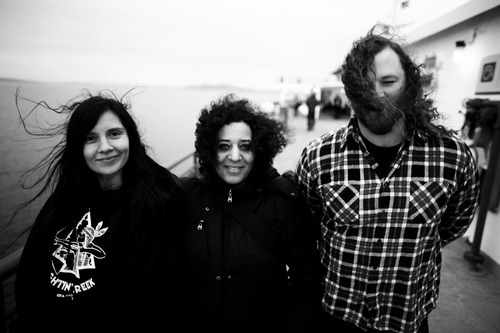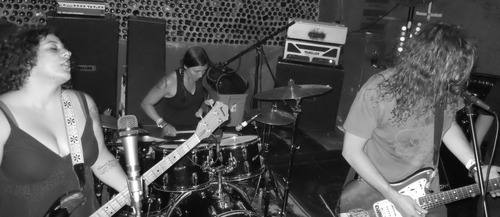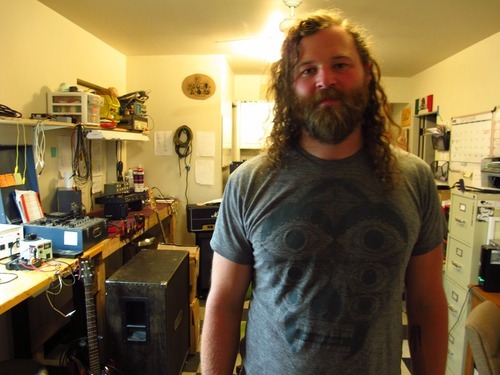


Let it never be said that Helms Alee are simply a metal band. The Seattle trio play a goddamn infectious blend of hook-laden rock ‘n roll that’s as much punk and pop as it is heavy metal. Their most recent offering, the sublime Sleepwalking Sailors finds them channeling their myriad of influences into a singular sound, resulting in their finest album yet. It comes as no surprise that guitarist/vocalist Ben Verellen (Harkonen/Roy) doesn’t take himself or the hype too seriously as that’s arguably the characteristic and attitude that’s given Helms Alee the recognition and acclaim they deserve. For these three, It’s about doing what they love, and Helms Alee do it well and loud. SfB reached out to Verellen to talk about the new record, why he’s thankfully not a part of any scene, and the possibility of a Harkonen and Roy reunion.
What was the thought process for you guys going into making Sleepwalking Sailors? Did anything change just in the way of creative approach for the band?
It was about three years workin’ on it without really realizing we were working on a record. We kind of just – we’d get together a couple times a week and play, and at some point a couple years in, we realized we had enough material to do a record. I’m trying to think of what’s really changed from the previous record to this one. I don’t know. Nothing too major, to be honest.
When I think about the band, it’s really just kind of plowed from the beginning and always been a real straight approach without a whole lot of twists and turns with us trying to do things differently. It’s always just kind of been us getting together a couple times a week, playing music, and just being weirdos. At some point in all that you end up with a whole buncha songs and turn them into a record.
Starting from your earliest days as a music fan to your time with Harkonen and Roy to where you are now with Helms Alee, how have you seen yourself evolve both musically and personally?
I definitely feel like I had a pretty clear cut path from a pretty young age to realizing I was obsessed with music and wanted to do something with music for the rest of my life. I think probably about age thirteen it was pretty clear. My brother Dave who’s in that band Botch – I remember him coming home from trying out for the band, and he was like “I got in the band! I’m in the band! I’m in the band!” Everything after that was just me sneaking to their practices and listening in and being excited about it.
Fast forward four years later, and I got to tag along with them to Europe and touring around the country as a teenager. That just kind of fueled me to try and get something together so I could have some of the same kinds of adventures. Of course, they were really incredible musicians as well, so there was always that inspiration around, and a really broad range of influences for those guys that bled into my tastes as well.
You think back to like Harkonen and Roy and Helms Alee and These Arms are Snakes – none of those bands sound too much alike. Harkonen is probably the closest thing to Helms Alee, I guess. Roy is kind of out of left field as some people say, but those things are all just a result of what I was listening to when I was a kid.

photo credit: Nik Christofferson
Were there any specific bands then from when you were a kid that impacted you more than others and gave you that initial creative inspiration?
Absolutely. The first one was probably my brother’s band, Botch. And then at some point I’d say probably about my junior year of high school, my brother again turned me on to this band Karp. To me, that was like the most incredible thing on the planet because it was a super heavy band that sounded like nothing else I’d ever heard. Just the sounds were so unique. They were in this element of a kind of sense of humor, and intelligence that most hardcore bands didn’t have. That was a really inspiring moment for me, I think. Definitely steered things for me for what I would do and what music interested me.
How have you personally seen the heavy music genre evolve for both good and bad since you first became involved with and began making music of your own?
First of all, I’ve never felt too married to any particular scene. I don’t consider myself a member of the heavy music community anymore than I do just somebody that’s just interested in general, so a lot of that stuff I just try not to pay attention to. When I think about what the trends are just in terms of what kind of heavy bands are popular, and I’ve got my favorites, and they’re sort of oddballs, and I think they’re probably not necessarily the most popular or heavy bands that are considered the thing of the day.
But I do like a lot of them in the sort of heavy music underworld of bands. The ones I can think of that pop up to me are mostly bands we’ve toured with, we’re buddies with like the Big Business guys, and the Torche guys, the Red Fang guys, and I don’t think it’s necessarily just because we’ve gotten to know those bands. I think those are actually some of the bands that are super interesting. It seems to me like on the side of that, there’s been all these genres that have kind of been popular and come and gone sort of on the side of those bands I just mentioned.
It seems like Mastodon kind of tipped off a wave of these proggy metal bands, and that came to be a big thing. And I really like Mastodon a lot, but it seems like one of those things where they do really well, and then some bands – or a lot of bands – don’t do it really quite as interesting. There seemed to be a lot of those that were popular.

It’s interesting you bring up Mastodon, a heavy music band considered mainstream by some and still underground by others somehow. It makes me think of the broader spectrum of what we consider when we use that kind of terminology. I think of labels like Hydra Head who put out and helped discover some of the most well respected heavy music artists of the last decade only to succumb to financial issues. Are the terms of underground or mainstream even relevant anymore?
It’s weird, isn’t it? Because what it is a mainstream metal band now? Who is it? Metallica? I don’t know. Are there other mainstream heavy bands? It’s not like when I was a kid, and there were like ten or twelve heavy bands getting played on MTV and were super huge bands. Now it’s sort of like a level playing field, I guess you could say. I have some buddies in bands who are playing in a band for a living, which is the dream for a lotta people.
They’re working hard. They’re in bands that are “successful” and well known, and you see the places they’re playing, and you think ‘Oh man, they must be just raking it in and doing great,’ and they are surviving and functioning and doing great and professional musicians, but they’re working hard, touring all year long, and it’s not just easy. I don’t know that there was a time when it was just like ‘You’re a rockstar now. Your band is really popular.’ It seems like even on the super popular side of things, those bands have to work hard.
Is it easier from your perspective for a band who’s experimenting or kind of on the fringe of several genres to gain exposure now as opposed to ten years ago? Is the social media culture more adept at absorbing more abrasive music, or is it simply a result of the constant exposure on the internet?
It’s been really interesting since we started working with Sargent House, who’s releasing the new record, just to see how much attention they’ve brought to the band. Without spending any money on advertisements, without a big budget music video, or all the things that might be the traditional ways to promote a band – just by using the free social media stuff that everybody has access to. I think it’s a matter of elbow grease. The spotlight is on everyone now, and it’s really just a matter of how much work you’re willing to do to bring attention to what you’re doing.
What’s your creative process like, Ben, and has that changed for you personally over the years?
I think a big part of that has been dependent on the part of the project, for me. I think about the band Roy. There was a kind of handful of individuals writing all the songs for that and then sticking them together. I’d write a song, then Brian would write a song, and that was how that band worked. Helms Alee is a completely different animal in that there’s not a whole lot of ideas brought to practice from home.
We all just get together and see what comes. It’s cool because it’s sort of shooting from the hip stream of consciousness, for lack of a better word. Just whatever comes out, try it. The good ideas stick and the bad ones don’t, so it’s sort of like an automatic approach. There’s not a whole lot of sitting down to consciously think through an idea for a song. It’s more whatever just happens will come out.
I think it’s a given that in any interview you’re gonna be asked about a possible Harkonen reunion, so I’ll just go ahead and take care of that here, but I’m also curious about Roy. Any chance of either of those groups reuniting?
[Laughs] I don’t mind those questions. I’m lucky that all the bands I’ve played in that those people are dear friends of mine. I’m still in touch with all of them, and I’m sure both of those bands will play music together again. Harkonen got together for “reunion shows” like once or twice a year there for a couple of years. Matt just had a kid and got married, and so that might make things a little trickier, but I’m sure somewhere down the road we’ll get together and play more music. I don’t know about records and stuff like that, but who knows?
(via Steel for Brains)
